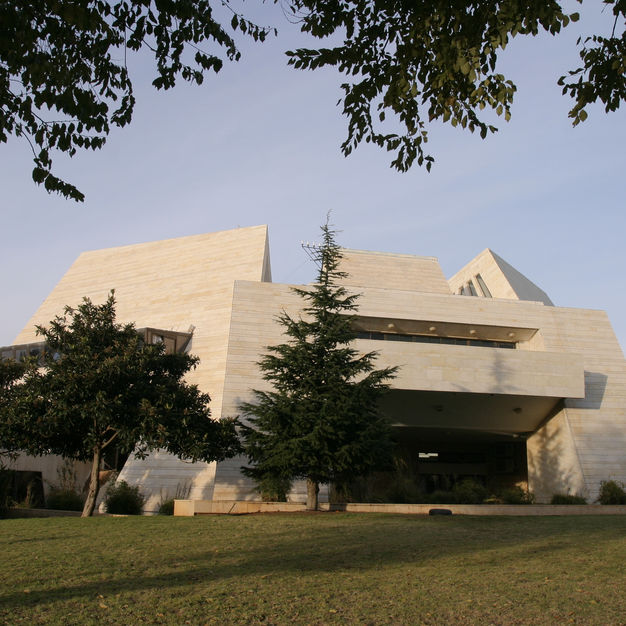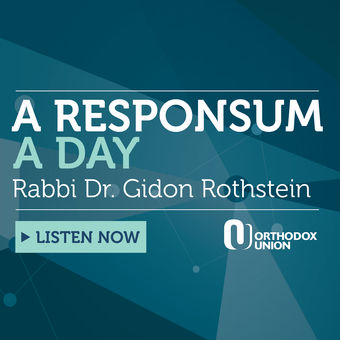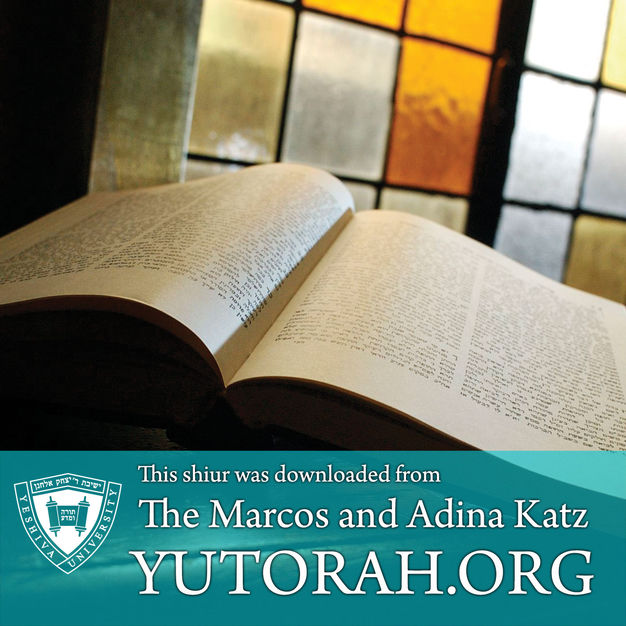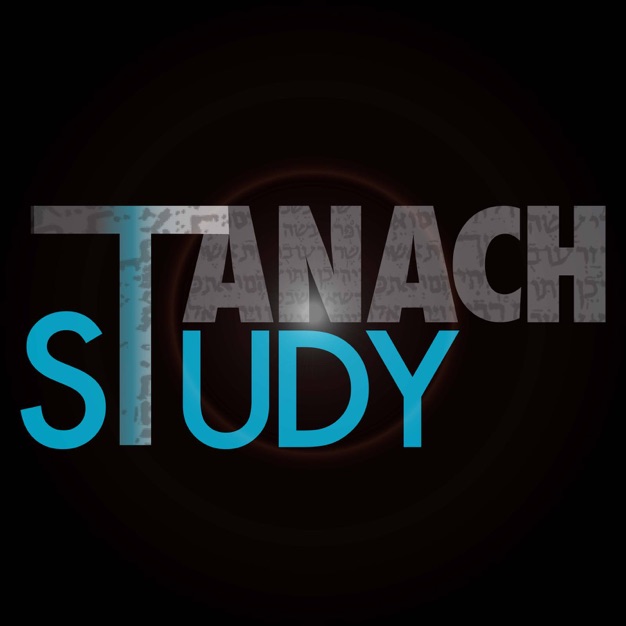
KMTT - the Torah Podcast
Ezra Bick
A 30-40 shiur on a Torah topic, every working day, from Yeshivat Har Etzion and the VBM.
- 14 minutes 9 seconds10 Ways to Merge October 7th into our Seder Experience
10 Ways to Merge October 7th into our Seder Experience, by Rav Moshe Taragin
Which moments in the haggada can we anchor to our conflicting emotions of the past six months.
Audio shiur with a printable tip sheet >>
21 April 2024, 8:19 pm - 33 minutes 37 secondsPesach | A Tale of Two Sedarim: From Bnei B'rak to Lod
A Tale of Two Sedarim: From Bnei B'rak to Lod, by Rav Yitzchak Etshalom
Why wasn't R. Gamliel at the "Seder" in B'nei Brak?
Although we envision the evening of the Seder as being focused on the story of יציאת מצרים, there is another theme which holds a position of honor in the evening's discussion - the laws of Korban haPesach. Just as the famous "Seder" in Bnei Brak involved 5 of our greatest sages engaged in the recounting of the story of the Exodus all night, the Tosefta tells of a "parallel" seder led by R. Gamliel, where the focus of discussion all night was הלכות (קרבן) הפסח. The significance of the Korban, although relegated to commemorative status after the destruction of the Mikdash, still has a significant impact on the nature of the evening. We explore the dispute among Tannaim - and, later - Rishonim - as to whether the Korban Pesach needed to be eaten before midnight or could be eaten until dawn as a reflection of different approaches to understanding the underlying reason for the Korban and, essentially, the nature of the celebration of this most powerful of sanctified feasts.
18 April 2024, 6:47 am - 28 minutes 43 secondsThoughts on the Iranian Attack
Thoughts on the Iranian Attack, by Rav Moshe Taragin
Upon Eagle's Wings or Under a Succah? Creating Remedies Prior to Perils...During Dark Periods of History; Taking The Battle To The Heavens
14 April 2024, 9:38 am - 37 minutes 57 secondsPesach | Dayyenu?!
Pesach | Dayyenu?! by Rav Yitzchak Etshalom
Would it really have been enough?
One of the most popular hymns included in all Haggadot is the two-part paean "Dayyenu", which is a relative latecomer to the evening - it first appears in R. Saa'diah's Machzor as a song that some sing at the end of the evening. Its popularity, in a sense, clouds the myriad difficulties that these lines raise: Why does this praise extend far beyond the spatial and temporal bounds of "Yetziat Mitzrayim" to include the building of the Mikdash? Why are the unusual terms "Ma'alot" and "Makom" used here? Why is the list of kindnesses for which we thank Hashem repeated here? Why does the author seemingly double-up on certain events, as if to deliberately extend the list? And, the bottom line question is: "Dayyenu"? Would it really have been enough for us had Hashem stopped before any of these stages? Enough intro - to the shiur...
11 April 2024, 9:18 am - 56 minutes 20 secondsHaggada Highlights and Pesach Insights
Haggada Highlights and Pesach Insights, by Rav Dovid Gottlieb
10 great ideas for the Seder and throughout Pesach, Women's Halacha Shiur at Kehillat Haela (RBS)
11 April 2024, 9:00 am - 57 minutes 29 secondsCan You Invite Non-Religious Guests for Shabbat or Yom Tov Meals??
Can You Invite Non-Religious Guests for Shabbat or Yom Tov Meals?? by Rav Dovid Gottlieb
In the last shiur we saw 16! different possible mitzvot when relating to non-frum Jews. Today we will discuss invitations, especially relevant as we are coming upon the Pesach Seder.
Most people have non-Orthodox relatives and/or co-workers - can you invite them for a Shabbat meal or to the Seder if you know that they will drive? What responsibility do we have for other people's sins?
4 April 2024, 7:42 am - 31 minutes 23 secondsShemini | Who Are "Those Who Are Close To Me"?
Shemini | Who Are "Those Who Are Close To Me"? by Rav Yitzchak Etshalom
What did Moshe mean when he said הוא אשר דבר השם בקרובי אקדש?
The dramatic and climactic narrative of the "Eighth Day" is shattered by the tragic death of Nadav and Avihu, which is followed by Moshe's words (of consolation? encouragement?) to Aharon and then by the Divine command, given (for the only time) exclusively to Aharon, regarding the ban on entering the Mishkan while inebriated. The narrative then continues with the details of Aharon and his surviving sons and their continuing the special worship of the day. Moshe's words to Aharon are, however, a bit unclear - is he consoling him over the death of his sons or is there an even grander statement being made? We explore the statement through the eyes of the Sifra and Rashi, but then see a distinctly different approach suggested by Rashbam and R. Yosef Bekhor Shor.
4 April 2024, 7:15 am - 28 minutes 19 secondsRamban on the Torah | 40 | Shemini
Ramban on the Torah | 40 | Shemini, by Rav Eli Weber
When does Moshe give Aharon a pep talk? When was Birkat Kohanim actually said? What was the sin of Nadav and Avihu?
4 April 2024, 7:08 am - 57 minutes 46 secondsLoving our Fellow Jews: The Obligations and Limits of Kiruv
Loving our Fellow Jews: The Obligations and Limits of Kiruv, by Rav Dovid Gottlieb
First in a series on our relationship with fellow Jews distant from yiddishkeit. What we are fortunate enough to experience, we forget is only relevant to a painful minority, even here in Israel.
A shiur in practical halakha given at Kehillat Haela, Ramat Beit Shemesh, on March 27th, 2024
28 March 2024, 7:56 am - 30 minutes 38 secondsTzav | What is Torat Ha-Olah?
Tzav | What is Torat Ha-Olah? by Rav Yitzchak Etshalom
Why doesn't the opening section of Parashat Tzav actually talk about the korban ha-olah - even though it's titled zot torat ha-olah?
The first seven chapters of Vayikra are devoted to detailed instructions regarding the various קרבנות; the first five, which make up פרשת ויקרא, present nearly all of the offerings from the perspective of the donor, whereas the next two, which make up over half of פרשת צו, address the same range of קרבנות from the vantage point of the כהנים - the officiants. The opening פרשה in צו is titled "תורת העולה" yet it doesn't provide any further details about the קרבן העולה - but the subsequent פרשות all do present numerous details about the מנחה, about the חטאת etc. We explore the unique role of the קרבן עולה and its vital role in the ongoing sanctification of the altar as well as the continuous presence of השם in the משכן.
28 March 2024, 7:44 am - 30 minutes 54 secondsRamban on the Torah | 39 | Tzav
Ramban on the Torah | 39 | Tzav, by Rav Eli Weber
How is Tzav different from Vayikra? Is Derekh Eretz a requirement or a suggestion? In what order did these parashot happen? And more...
27 March 2024, 6:46 pm - More Episodes? Get the App
Your feedback is valuable to us. Should you encounter any bugs, glitches, lack of functionality or other problems, please email us on [email protected] or join Moon.FM Telegram Group where you can talk directly to the dev team who are happy to answer any queries.
 A Responsum a Day
A Responsum a Day
 KESHET - The Torah Podcast
KESHET - The Torah Podcast
 Rabbi Brovender Parsha Shiur
Rabbi Brovender Parsha Shiur
 YUTORAH: Kollel Yom Rishon -- Recent Shiurim
YUTORAH: Kollel Yom Rishon -- Recent Shiurim
 Tanach Study
Tanach Study